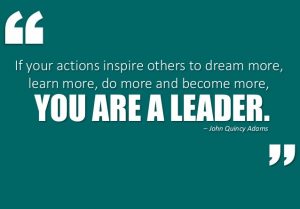There is a wonderful line in the movie “Invictus,” where President Mandela (played by Morgan Freeman) is speaking to Matt Damon, who is the Captain of the South African Rugby Team. He asks “What is your philosophy on leadership?” It is a line that has caused me to pause and ask the next question, which is “as a leader in your organization, who would want to be led by you?” To answer that, I’d need to ask, “What do you stand for as a leader?”
to be led by you?” To answer that, I’d need to ask, “What do you stand for as a leader?”
Philosophy and Leadership
The practice of philosophy as an activity involves asking questions, critical reflection, testing and creating principles and beliefs that explain relationships of one to another. It is the “investigation of the nature, causes or principles of reality, knowledge or values based on logical reasoning rather than empirical methods” (American Heritage Dictionary); “the study of the ultimate nature of existence, reality, knowledge and goodness, as discoverable by human reasoning” (Penguin English Dictionary); and “the rational investigation of questions about existence and knowledge and ethics” (WordNet).
In other words, it reflects a generalized relationship between entities, such as our intent and the impact of our behavior and a mindset or attitude toward an issue, and how things will work. When philosophy is actualized, it reflects behaviors that reflect values.
A leadership philosophy is akin to having an internal operating mechanism (mindset that includes understanding of intent to impact and values) that guides you as the leader (who you are) and your leadership (what you do). As “leaders,” we are constantly under review as people take cues from the leader of what gets done and, importantly, how it gets done.

What Can a Leadership Philosophy Do For Me?
Hence, having a leadership philosophy is important. First, it conveys to others what you believe is your core purpose. That is, how do you see yourself, your role and reason for being a leader in your organization? Your purpose is what gives your “reason for being” fuel to propel to pursue your best you, and to keep striving to be the more “complete you.”
Secondly, leadership philosophy identifies your values by identifying specific behaviors. For instance, if you say you value an “inclusive environment,” you’ll need to identify specific behaviors that demonstrate how you create and support inclusion. Your values and your corresponding behaviors speak to your character, which is what you value, say you will do and with the right intent. Identifying what you stand for supported by specific behaviors is a significant step in developing your own self-awareness.
Thirdly, a leadership philosophy creates a roadmap for others to see and understand by helping others to identify how you will make decisions, your actions and, importantly, your expectations of others. When you are mindful of your impact on others, you become consistent in your actions and demonstrative behaviors that link your intent to impact. This is important to developing trust. Your actions will speak louder than your words.
Key Lesson
Your leadership philosophy helps clarify your own assumptions of who you are by helping you critically examine what you want (purpose), who you are (self-awareness), your leadership style (values) and answers the question (who wants to be led by you (inspiration).
Eleanor Roosevelt once said:
“Ones’ philosophy is not best expressed in words; it’s expressed in the choices one makes. In the long run, we shape our lives and we shape ourselves. The process never ends until we die. And, the choices we make are ultimately our own responsibility.”
For more reading on leadership and philosophy, check out:
Authentic Leadership Means Finding Your True North
Andrew Rahaman is part of the GovLoop Featured Contributor program, where we feature articles by government voices from all across the country (and world!). To see more Featured Contributor posts, click here.





Leave a Reply
You must be logged in to post a comment.